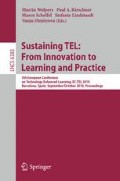Abstract
An inquiry-led investigation with technology was designed and implemented, aiming to enhance our understanding of how inquiry learning takes place within a personal, socio-cultural and institutional context. Children used personal technologies across contexts, to plan and collect evidence, analyse and share their work. These technologies are boundary objects, connecting students’ experiences across the classroom, out-of-class activities, a fieldtrip and the home, and enabling students to carry out inquiry activities autonomously. The science teacher aimed to maintain a sense of continuity across contexts by utilising specific management strategies: interchanging between highlighting and constraining technology use, ensuring that all students know what they need to do in and out of class, communicating interdependencies among groups and by translating group data to an overview of the whole class data. These strategies are identified as prerequisites for any successful inquiry learning experience to take place.
Access this chapter
Tax calculation will be finalised at checkout
Purchases are for personal use only
Preview
Unable to display preview. Download preview PDF.
References
Dewey, J.: How we think: a restatement of the relation of reflective thinking to the educative process, Boston, MA, Heath (1933)
Millar, R.: Towards Evidence-based Practice in Science Education 3: Teaching Pupils ‘Ideas-about-science’, June 2003. Teaching and Learning Research Briefing, vol. 3. Teaching and Learning Research Programme, London (2003)
Sandoval, W., Deneroff, V., Franke, M.: Teaching, as learning, as inquiry: moving beyond activity in the analysis of teaching practice. Presented at Annual Meeting of the American Educational Research Assn., New Orleans, LA, April 1-5 (2002)
Millar, R.: Thinking about practical work. In: Amos, S., Boohan, R. (eds.) Aspects of secondary science. Routledge/Falmer and the Open University, London and New York (2002)
Vavoula, G., Sharples, M.: Meeting the Challenges in Evaluating Mobile Learning: a 3-level Evaluation Framework. International Journal of Mobile and Blended Learning 1(2), 54–75 (2009)
Sharples, M., Corlett, D., Westmancott, O.: The Design and Implementation of a Mobile Learning Resource. Personal and Ubiquitous Computing 6, 220–234 (2002)
Star, S.L., Griesemer, J.R.: Institutional Ecology, ’Translations’ and Boundary Objects: Amateurs and Professionals in Berkeley’s Museum of Vertebrate Zoology, 1907-39. Social Studies of Science 19, 387–420 (1989)
Harvey, F., Chrisman, N.: Boundary objects and the social construction of GIS technology. Environment and Planning A 30(9), 1683–1694 (1998)
Scanlon, E., Anastopoulou, S., Kerawalla, L., Mulholland, P. (under review). Scripting personal inquiry: using technology to represent and support students’ understanding of personal inquiry across contexts. Manuscript submitted to Journal of Computer Assisted Learning
Braun, V., Clarke, V.: Using thematic analysis in psychology. Qualitative Research in Psychology 3(2), 77–101 (2006)
Author information
Authors and Affiliations
Editor information
Editors and Affiliations
Rights and permissions
Copyright information
© 2010 Springer-Verlag Berlin Heidelberg
About this paper
Cite this paper
Anastopoulou, S. et al. (2010). Maintaining Continuity of Inquiry Learning Experiences across Contexts: Teacher’s Management Strategies and the Role of Technology. In: Wolpers, M., Kirschner, P.A., Scheffel, M., Lindstaedt, S., Dimitrova, V. (eds) Sustaining TEL: From Innovation to Learning and Practice. EC-TEL 2010. Lecture Notes in Computer Science, vol 6383. Springer, Berlin, Heidelberg. https://doi.org/10.1007/978-3-642-16020-2_2
Download citation
DOI: https://doi.org/10.1007/978-3-642-16020-2_2
Publisher Name: Springer, Berlin, Heidelberg
Print ISBN: 978-3-642-16019-6
Online ISBN: 978-3-642-16020-2
eBook Packages: Computer ScienceComputer Science (R0)

